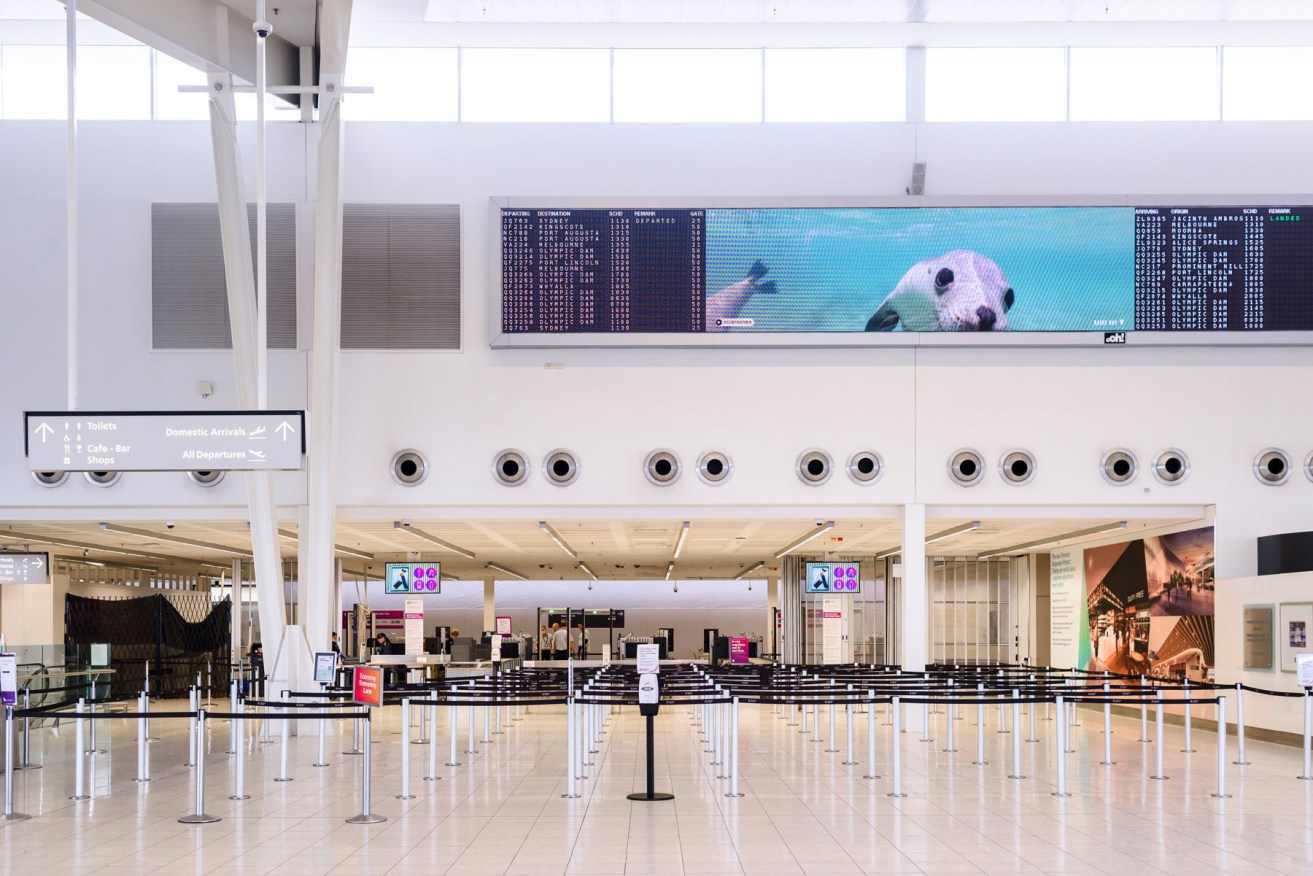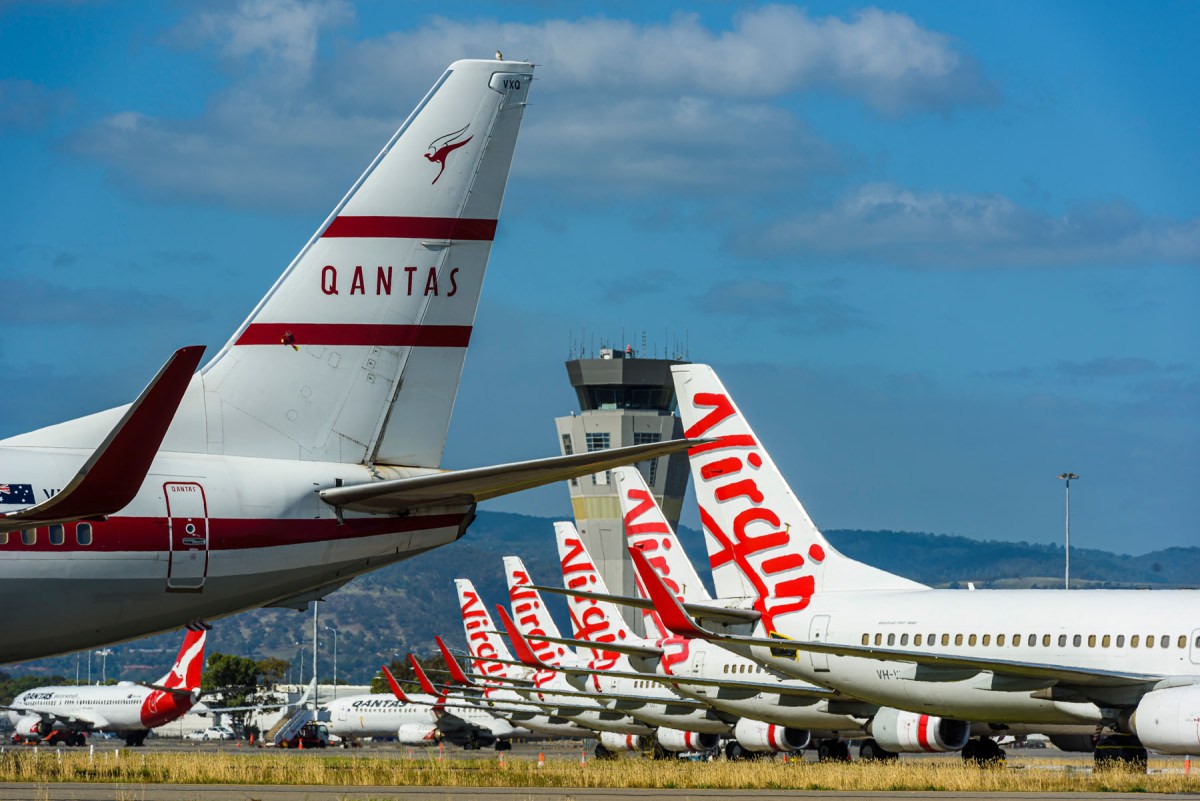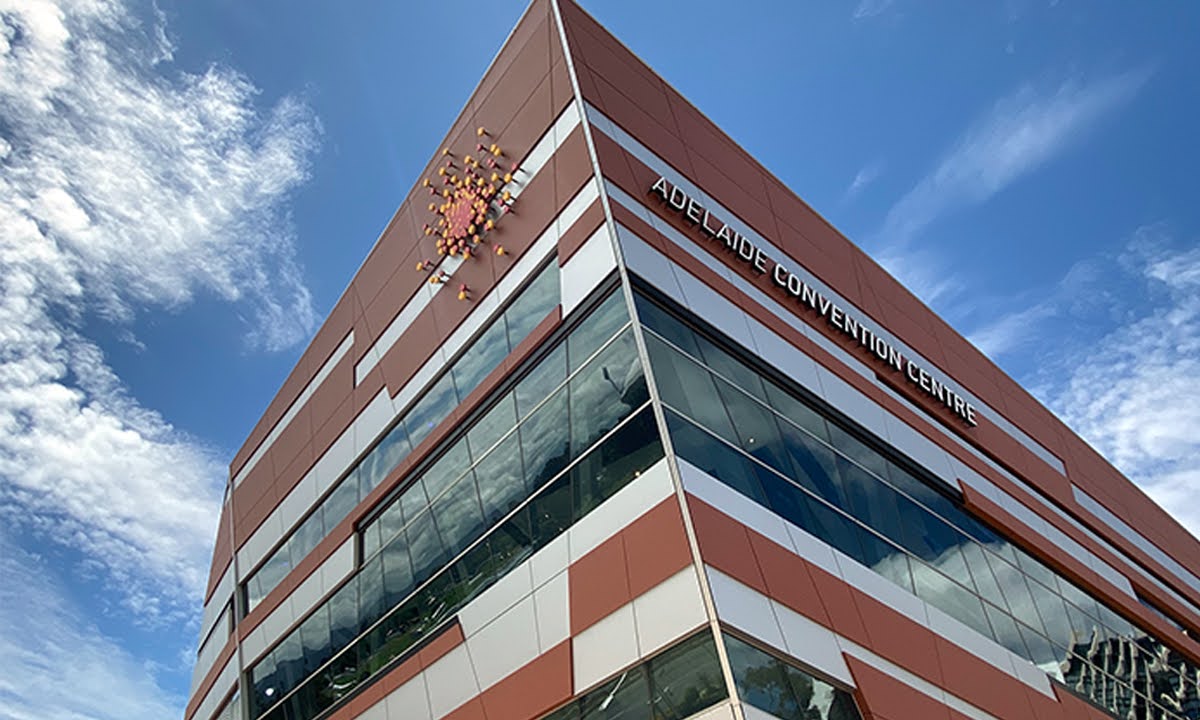Adelaide’s ghost town gateways search for signs of economic life
From the airport to the convention centre and beyond, Adelaide’s global-facing institutions are counting the cost of COVID-19. As Belinda Willis reports, they’re searching hard for positives.


Photo: Simon Casson
Eleven planes are parked on the tarmac at a near-empty Adelaide Airport while the city’s major entertainment arena, usually swarming with thousands of patrons each week, is eerily empty.
In the parklands, Adelaide Oval staff oversee empty stands. Across the River Torrens, plans for seven national conferences attracting up to 3000 delegates at the city’s flagship Adelaide Convention Centre during May have been dashed.
As the state gradually emerges from its COVID-19 lockdown, its major venues that normally draw millions of tourist dollars into the state are instead counting the cost of not doing business.
Brenton Cox is Adelaide Airport’s executive general manager finance and corporate. He says the airport is suffering across the entire business.
“There are no international passenger flights compared with a normal schedule of around 50 flights per week and there are only approximately 30 largely empty interstate flights per week compared to the airport’s normal schedule of 500 flights per week,” he said.
“There is currently only one retailer open in the main terminal and there is a significant reduction in business activity elsewhere throughout the Airport Business District.”
On the tarmac, four Qantas aircraft and another seven planes belonging to Virgin are parked long term and the majority of the airport’s staff of about 180 still works from home.
All international services are cancelled. The last international passenger flight – aside from repatriation flights – was Air New Zealand on March 27.
Cox said despite the airport’s private ownership, its lack of income and its high cost of operation, it is deemed an essential service and was trying to play its part in the face of the global pandemic.
“We have remained open in a significantly reduced capacity throughout the pandemic to ensure people who still need to fly for essential reasons have been able to reach their destination,” Cox said.
“The arrival and departure of medical retrieval flights and freighters have been able to continue as usual.”

Photo: Simon Casson
Cox said a once a week freighter aircraft is currently operating between Adelaide and Singapore operated by Singapore Airlines. Malaysia Airlines is also operating an ad hoc, on-demand, freighter service.
But domestic airlines are at a near standstill. Qantas is not operating a single domestic flight compared to the pre-COVID average of 64.
In pre-COVID times Virgin averaged 42 flights a week compared to its current three flights weekly to Melbourne and three weekly services to Perth. While Jetstar is operating a daily service to Melbourne and Sydney, it usually averages 19 domestic flights a week.
Many of those cancelled flights would likely to have been filled by delegates planning to attend the growing list of conferences halted across the state.
May was supposed to be the month when the Ozwater National conference attracted 1100 delegates to the Adelaide Convention Centre and for another 500 to be attending the Australian Dementia Forum.
A National Lions Convention at the Adelaide Showgrounds was expecting 1400 people, all those valuable dollars instead lost to the state’s accommodation and hospitality industry.
Adelaide Convention Bureau chief executive officer Damien Kitto said losses from cancelled and postponed conferences across the state are devastating.
But there is some positive feedback coming from those who had booked business events in South Australia this year.
“(Our) dedicated client care on behalf of our members is paying off to date with a very receptive mood toward postponement into next year rather than cancellation,” he said.
“We are very fortunate indeed that has been the mood but, of course, the current losses for our members are devastating and these cannot be recovered and we are doing everything we can to support them by ensuring that we can assist in revitalising the SA economy next year.”
Future plans are, of course, are up in the air.
“Although we hope we may be able to have some small to medium intrastate events we have no specifics to date. We are working with the airport, hotels and venues on our future plans,” Kitto said.

Photo: Tony Lewis/InDaily
Anthony Kirchner is chief executive officer of Adelaide Venue Management and responsible for the running of some of the state’s largest venues – the Adelaide Convention Centre, Adelaide Entertainment Centre and Coopers Stadium.
In pre-COVID times, the Adelaide Entertainment Centre alone would host up to 10,000 people every week, but instead, its line-up of acts and events are cancelled.
All of Adelaide Venue Management’s 150 full and part-time employees continue to work their regular pre-Covid hours, with about 80 working from home.
Its maintenance team is using the downtime to undertake repairs and servicing to major plant and equipment like escalators, lifts and air-conditioning.
“(But) Adelaide Venue Management has approximately 850 casual employees who primarily provide event-related services,” Kirshner said.
“No events means that there is very little work for these casual employees sadly given current restrictions.
“A percentage of our casual employees are experiencing financial hardship due to Adelaide Venue Management being ruled ineligible for the JobKeeper Payment.”
The company was keeping in touch with these staff, he said, keeping them informed of other assistance they can access.
“We’ve also been supporting these staff via the introduction of an Event Staff Food Initiative, which provides them with the opportunity to access good quality food prepared by our kitchen teams at nominal cost.”
One of the positives amid the carnage, Kirshner said, was that Adelaide Venue Management had found ways to repurpose its sites for the public good.
“We’ve been working with various community organisations, such as Meals on Wheels, that have experienced increased demand for food during these times,” he said.
“We’re proud to have produced hundreds of thousands of meals since early April to support these community organisations provide food for vulnerable people. It’s been great to be able to assist these organisations whilst also keeping our full and part-time staff busy.”
In the parklands, some staff members are trickling back to work with the reopening of the Adelaide Oval Roof Climb and Koffee Ink café operations, an Adelaide Oval spokesperson said.
“(But) with no major events possible under the current restrictions, the majority of our permanent and casual workforce remain in stand down,” she said.
“The implementation of Step 2 of the roadmap from June 1 will allow for our Functions and Events team to host events in accordance with those regulations and a number of functions have already been booked for the coming months.”
In the meantime, she said, maintenance teams were working to ensure “Adelaide Oval is looking its absolute best for when we’re able to welcome fans back to the stands”.
When that might happen is another unknown.
This article is supported by the Judith Neilson Institute for Journalism and Ideas.

Want to comment?
Send us an email, making it clear which story you’re commenting on and including your full name (required for publication) and phone number (only for verification purposes). Please put “Reader views” in the subject.
We’ll publish the best comments in a regular “Reader Views” post. Your comments can be brief, or we can accept up to 350 words, or thereabouts.




